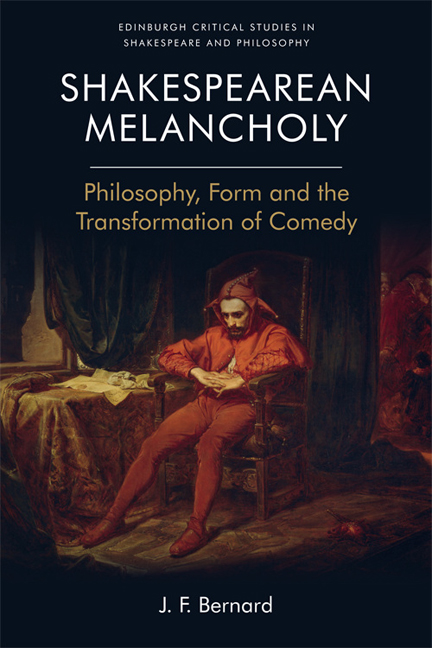Book contents
- Frontmatter
- Contents
- Acknowledgements
- Series Editor's Preface
- Miscellaneous Frontmatter
- 1 What's so Funny about Humours? Melancholy, Comedy and Revisionist Philosophy
- 2 Comic Symmetry and English Melancholy
- 3 Melancholic Dissonance and the Limits of Psycho-Humoralism
- 4 Melancholic Ambience at the Comic Close
- 5 Melancomic Time in Late Shakespeare
- 6 The Philosophical Afterlives of Shakespearean Melancholy
- Works Cited
- Index
3 - Melancholic Dissonance and the Limits of Psycho-Humoralism
Published online by Cambridge University Press: 14 September 2018
- Frontmatter
- Contents
- Acknowledgements
- Series Editor's Preface
- Miscellaneous Frontmatter
- 1 What's so Funny about Humours? Melancholy, Comedy and Revisionist Philosophy
- 2 Comic Symmetry and English Melancholy
- 3 Melancholic Dissonance and the Limits of Psycho-Humoralism
- 4 Melancholic Ambience at the Comic Close
- 5 Melancomic Time in Late Shakespeare
- 6 The Philosophical Afterlives of Shakespearean Melancholy
- Works Cited
- Index
Summary
‘I'd never join a club that would allow a person like me to become a member.’
Groucho Marx's resignation joke, allegedly included in a letter informing the Friars’ Club of his withdrawal from membership, provides an arresting parallel to the melancholic figures I discuss in this chapter. It has been attributed over the years to dignitaries such as Sigmund Freud and Woody Allen (whose Annie Hall character Alvy Singer, an iconic comic melancholic himself, actually opens the film with this quote, acknowledging both Freud and Marx). To use Marx's terms, the melancholy of Much Ado about Nothing and The Merchant of Venice strikes an altogether dissonant comedic note that proves at once integral to and inherently at odds with the plays that contain it. If The Comedy of Errors and Love's Labour's Lost underscored the impracticality of galenic and Aristotelian philosophies of melancholy within Shakespearean comedy, the plays examined in this chapter bring such understandings to their point of collapse. They achieve such a rupture by exacerbating the negative traits associated with each of them as to render them utterly incompatible with the comic genre. The plays transform the galenic tenet of fear and sadness without cause into an overwhelming despondency that thwarts any attempt to turn melancholy into a comic foil. Concomitantly, the idea of genial melancholy morphs into a stubborn claim for interiority that rejects any potential for tempering or alleviating efforts. These dramatic manoeuvres highlight the growing disconnect between traditional definitions of melancholy and Shakespeare's comic re-envisioning of the concept. Conversely, they attest to the gradual transformation of comedy that Shakespeare's development of the melancomic provokes.
As this chapter suggests, both Don John and Antonio obstinately self-identify as melancholics, a characteristic that bespeaks their general lack of dramatic involvement. Contrary to Antipholus of Syracuse or the lovers of Navarre's Academe, comic action develops around them rather than through them. While the potential for their remediation exists in each play, their inertia ultimately leads to their failure to fully integrate with the play-worlds they inhabit. The ambivalent closing tableau of each play signals the breakdown of psycho-humoral representations of melancholy in Shakespearean comedy. Don John's brief participation in Much Ado provides a blueprint for such a process, since his nebulous claims of villainy in opposing the festive spirit that otherwise infuses Messina always proves subsidiary to his melancholic countenance.
- Type
- Chapter
- Information
- Shakespearean MelancholyPhilosophy, Form and the Transformation of Comedy, pp. 94 - 134Publisher: Edinburgh University PressPrint publication year: 2018



